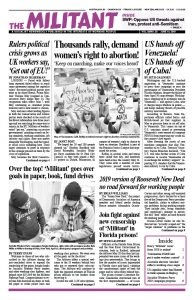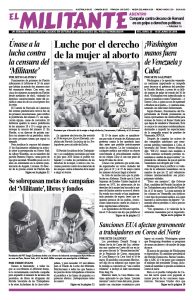The French edition of Cuba and the Coming American Revolution by Jack Barnes, national secretary of the Socialist Workers Party, is one of Pathfinder’s Books of the Month for June. The excerpt is from the first chapter, “1961: Year of Education.” As the author notes, “The victory of Cuban working people at Playa Girón punctured the myth of U.S. imperialism’s invincibility.” Copyright © 2001 by Pathfinder Press. Reprinted by permission.
On the morning of April 18, 1961, readers of daily newspapers across the United States woke up to front-page headlines proclaiming, “Rebels Near Havana, Invade Four Provinces.” …
Most Americans took the story as good coin, expecting to soon hear that the “pro-Communist dictator” Fidel Castro had been ousted.
Around the country, however, in dozens of cities and on a number of college campuses, there were pockets of individuals who knew from the beginning that every word of the AP story was a lie. We had been carrying out an intensive educational campaign for weeks to counter the Kennedy administration’s mendacious disinformation efforts. We were getting ready for the invasion we knew was coming, preparing to act here in the Yankee heartland side by side with the Cuban people the moment it was launched. Between April 17 and April 19, as the battle was being fought in Cuba, we confidently took to the streets, organized speak-outs, posted marked-up newspaper clippings a couple times a day, and went on the radio asserting that, all press reports to the contrary, the U.S. government-organized and -financed invasion was being defeated, not winning.
As we had been doing for months, we pointed to the immense popularity of the revolution among the Cuban people in response to the measures the new government was organizing them to take. The Mafia-run gambling dens and brothels, a national shame, had been shut down. Land had been distributed to more than 100,000 tenant farmers, share-croppers, and squatters. House and apartment rents, as well as electricity and telephone rates, had been slashed. Racial discrimination was outlawed and equal access not only made law but also enforced. The best public beaches, which had been previously off limits to blacks, had been opened to all. A nationwide campaign to eliminate illiteracy had been launched — part of a broader extension of public education to the countryside, among the poor, and for women. Popular militias had formed in factories, other workplaces, schools, neighborhoods, and towns across the island, as Cubans demanded arms and military training to defend their new conquests. The huge money-gouging U.S. monopolies had been nationalized, as well as the major landed, commercial, and industrial property holdings of the wealthy Cuban families who had been the social and political base of the Batista dictatorship.
Through more than two years of popular mobilization, the workers and farmers of Cuba had begun transforming not only their country but themselves. It was precisely for this reason, we explained, that Cubans could, and would, fight to the death to defend their revolution — and do so successfully. …
One of our biggest lessons was what happens in an imperialist country when war begins.
In a matter of hours on April 17, the broad undecided center had shrunk to a voiceless kernel. Months of concentrated political action preparing for the inevitable battle fell into place in a few decisive days. Committed builders of the Fair Play for Cuba Committee at Carleton in early 1961 had been fewer than half a dozen. But now came the payoff for the weeks of education, propaganda work, writing, talking, pushing for and organizing open political debate, and taking up the challenges of every opponent on every issue. As the workers and peasants of Cuba inflicted a crushing defeat on U.S. imperialism, support for the political positions we had been defending exploded overnight. But only because we were there, we were known, and we were prepared to respond. …
Our understanding of these class questions was accelerated immeasurably by the fact we were sharing our day-by-day experiences, as well as talking about them into the wee hours of the morning with communist workers in the Twin Cities. They were people like V.R. Dunne, who had been a member of the Communist International from its founding in 1919, a leader of the Teamsters strikes and organizing drives in the Upper Midwest during the 1930s, and one of the first victims railroaded to prison by the federal government under the infamous Smith “Gag” Act for opposition to U.S. imperialism leading up to and during World War II.
These workers pointed us to the history of the class struggle in the United States, to the lessons we needed to learn from the workers and farmers in this country whose fighting legacy we inherited. They drew on this rich history to help us understand what we had to be prepared for as we went up against the most violent and brutal ruling class in the world.
Above all, they taught those of us who, like themselves, were so strongly and passionately attracted to the example being set by the fighting workers and peasants of Cuba that the challenge — for us — was not in Cuba. Our fight was in the United States. Cuba’s workers and farmers had proven they could take care of themselves. Washington, to paraphrase Cuban Division General Enrique Carreras, would never be able to get that bone out of its throat.
Those workers like Dunne and others helped us see that the contest would end only with the defeat of the revolution in Cuba or a victorious socialist revolution in the United States.
“There is one thing we can most certainly tell Mr. Kennedy,” Fidel Castro told a cheering crowd in Cuba on March 13 of that year. “A victorious revolution will be seen in the United States before a victorious counterrevolution in Cuba.”
That had become our conviction too. But above all it was becoming the guide to a lifetime of action, a course of conduct born of the historic needs, interests, and capacities of the working class. As beyond belief as this revolutionary goal appeared to the average American, it had become clear to us it was the only realistic perspective, and we set out to speed the day.


